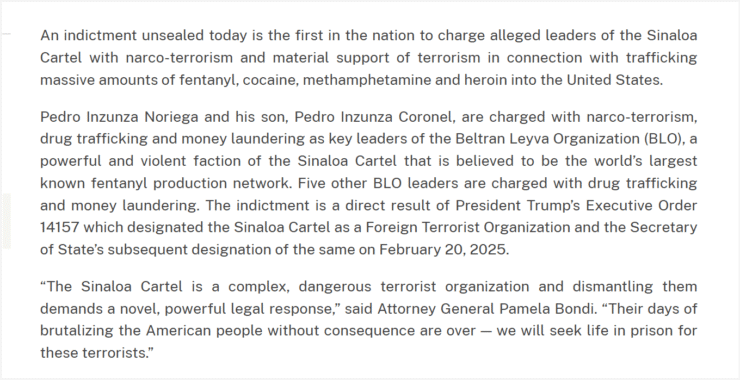Federal prosecutors have brought narco-terrorism and drug trafficking charges against two alleged high-ranking operatives of the Beltrán Leyva Organization (BLO), a violent faction of Mexico’s Sinaloa Cartel, after uncovering a complex network of fentanyl operations intertwined with cryptocurrency-based money laundering.
Pedro Inzunza Noriega and his son, Pedro Inzunza Coronel, were indicted in the Southern District of California this week. Authorities allege the pair were key figures in a vast fentanyl trafficking scheme responsible for moving tens of thousands of kilograms of the lethal synthetic opioid into the United States.
A major breakthrough in the case came following a December 2024 raid in Sinaloa, which resulted in the largest-ever seizure of fentanyl—over 1.5 tons. While the case has focused largely on the drug smuggling and violence carried out by the cartel, investigators revealed that financial forensics played a pivotal role in building the charges.

Blockchain analytics teams from firms like Chainalysis and TRM Labs had been tracking suspicious stablecoin flows linked to the cartel for over two years. The digital trail showed how fentanyl proceeds were being converted into cryptocurrencies—primarily Tether (USDT)—and moved through crypto wallets to Chinese suppliers and brokers involved in the production and distribution of fentanyl precursors.
Fentanyl Supply Chain Migrates to Blockchain Payments
Recent investigations by top blockchain intelligence firms have uncovered the deepening role of cryptocurrency in the global fentanyl trade, linking U.S.-based drug couriers to Chinese chemical manufacturers through stablecoin transactions.
In a March analysis, Chainalysis traced approximately $5.5 million in stablecoin flows—primarily in USDT—from wallets associated with cartel-linked operatives in the United States to Chinese vendors supplying fentanyl precursors. The firm characterized the movement as part of a fast-emerging “on-chain fentanyl economy,” where blockchain rails are enabling seamless, anonymous settlements between traffickers and overseas suppliers.
TRM Labs, another leading blockchain analytics firm, has similarly documented how Mexican drug cartels rely on Chinese underground banking networks to transform cash proceeds into digital assets. These stablecoins are then used to purchase chemicals or settle bulk shipment orders with foreign brokers.
A January report from TRM revealed a staggering trend: 97% of Chinese precursor vendors surveyed across 26 cities now accept cryptocurrency as a payment method. Many of those sellers are connected to crypto wallets that have been flagged by the U.S. Treasury and sanctioned by the Office of Foreign Assets Control (OFAC) for their role in cartel-related activity.
The findings underscore how illicit networks are increasingly bypassing traditional financial channels in favor of blockchain tools that offer speed, cross-border efficiency, and limited traceability—posing serious challenges to law enforcement agencies worldwide.
U.S. Authorities Target Cartel-Linked Crypto Wallets
U.S. authorities have increasingly turned to digital sanctions and asset seizures in their effort to disrupt the financial infrastructure supporting transnational drug cartels. Past enforcement actions have targeted Ethereum addresses and other blockchain wallets used to launder fentanyl profits across borders.
In September 2023, the U.S. Treasury’s Office of Foreign Assets Control (OFAC) sanctioned wallets tied to Mario Jimenez Castro, a known associate of the Beltrán Leyva Organization. According to investigators, Castro instructed operatives in the U.S. to deposit drug proceeds directly into cryptocurrency wallets, which were later used to funnel funds back to cartel leaders in Mexico.
A month later, OFAC expanded its crackdown, flagging 17 additional addresses connected to Chinese precursor suppliers and identifying over $3.7 million in crypto-linked financial flows. These actions highlighted how cartels are leveraging decentralized networks to mask transactions and complicate traditional money laundering investigations.
Quick Facts
- U.S. prosecutors indicted two Sinaloa cartel members—Pedro Inzunza Noriega and his son—on narco-terrorism and drug trafficking charges tied to fentanyl and crypto laundering.
- Blockchain forensics firms Chainalysis and TRM Labs tracked over $5 million in stablecoin payments from U.S.-based cartel operatives to Chinese chemical suppliers.
- A January TRM report showed 97% of surveyed Chinese precursor vendors now accept cryptocurrency as payment, many tied to sanctioned wallets.
- U.S. Treasury officials have sanctioned dozens of crypto wallets linked to the cartel’s fentanyl operations, signaling a shift toward digital enforcement strategies.





